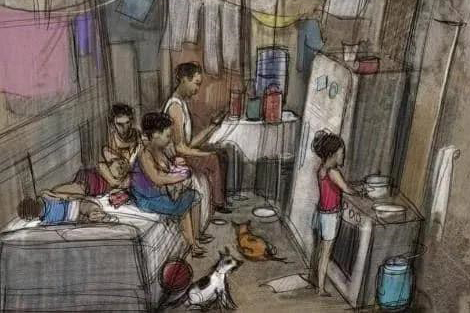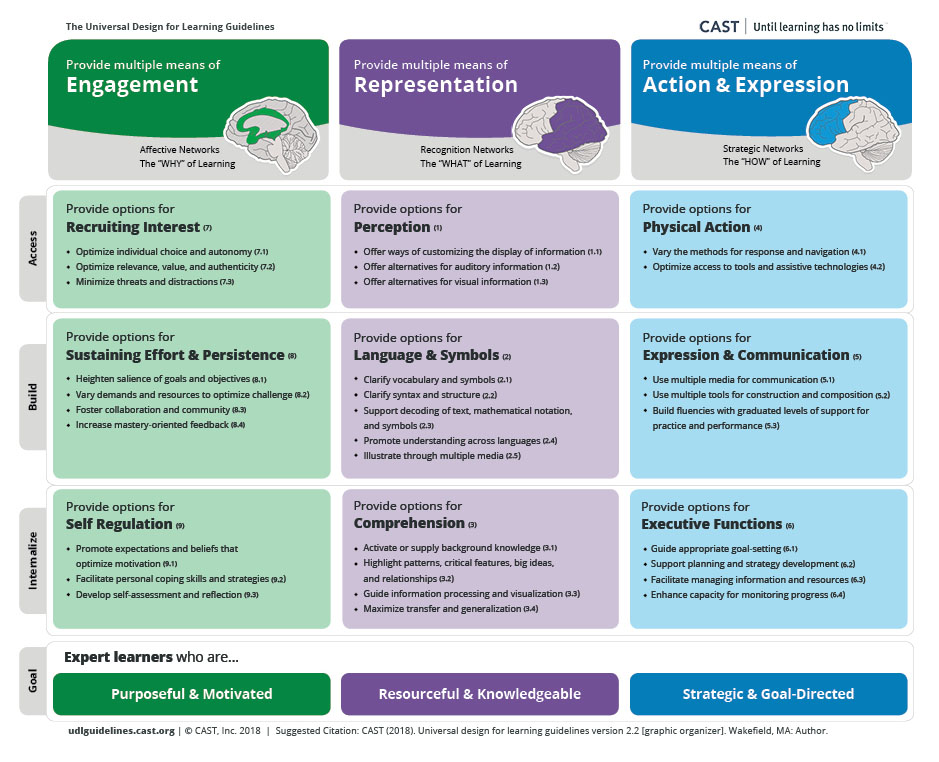Felton Institute has had a targeted, two-generation and culturally responsive approach to address COVID-19. Since shelter in place, Felton’s Children, Youth, Family and Transitional Age Youth Services Division launched these response services that included distance learning, mental health counseling, speech therapy, early intervention telehealth, access to food, essential household and baby items, financial and rental assistance, community resources and housing support.
During the past few months, our day to day has changed, and we have pivoted and worked diligently to support all children, youth and families with a targeted effort focused on the Latinx families and teen parents who are particularly vulnerable and have been impacted significantly as a result of COVID-19. Felton’s CFY & TAY Division has been uniquely positioned to respond with effective strategies in times of extraordinary community need, due to COVID-19. We realize that now more than ever, our two-generation services are essential for our families and our city’s economic recovery, health and wellness.
Early Care and Education Services
For almost 50 years, Felton has been providing early care and education (ECE) services to countless Bay Area families. Every year, approximately 430 children are served across four ECE programs in San Francisco’s Mission, Bayview and Visitation Valley neighborhoods. On March 16, 2020, when shelter in place was established, Felton’s ECE programs closed its doors. This was a very difficult decision, because we knew the challenges this would represent for predominately low-income families, who rely on Felton’s ECE services to attend school or go to work. We also knew that it was the right thing to do until further guidance was provided from our local department of public health. After about two weeks, when the staff members were able to settle into this new reality, and once we knew it was going to be extended, we decided to implement distance learning.
At that point in early April, Felton recognized that there was a need to extend early care and education program closures due to the COVID-19 crisis and the lack of adequate Personal Protective Equipment, cleaning supplies, and staffing to re-open. Therefore, in early May, we prepared and launched our “Distance Learning” programming to allow for social distancing as recommended by public health officials and as per the directive and new guidelines from the CA Department of Education. The plan includes opportunities for classroom teaching teams to provide teaching and engagement opportunities for each child that can be incorporated into their daily routine and assists with creating a predictable routine and schedule in their home. Classroom teams were able to create a sequence of engagements and activities for children to have access and support building family capacity and provide activities to promote developmental progress of social-emotional, language, and literacy, problem-solving skills, math, science, and physical health. All activities, to the greatest extent possible, have been provided in the preferred language of each family.
What does distance learning mean for children and the impact on school readiness?
The artistic rendering illustrates the realities and living conditions of many low-income children and families. It is a good reminder, and important to highlight, because, as educators, we need to consider what expectations we are setting forth with our children (such as expecting all children to join a Zoom video session at a specific time of the day), without taking into consideration the reasons why a family may not want to join or turn on their camera, or if they even had a digital device. Many of the families are using their smartphones to use FaceTime, but we have noticed that not all want to engage in video calls. Distance Learning has also exposed the gaps to formal education of the families, the majority of whom are immigrant and monolingual in Spanish or Cantonese. The reality is that the inequities that will be exacerbated by a lack of routine, less support from teachers, and more chaos due to the stressors of unemployment, lack of food, domestic violence, etc… will impact children’s wellbeing, particularly children with special needs that require accommodations. Felton will continue to do our best to offer support and fill the gap during these unprecedented and difficult times for all. The COVID-19 pandemic has shed light on the inequities in early care and education programs’ learning opportunities for children. Sadly, child abuse and domestic violence are more prevalent and at all-time highs right now due to stress and financial hardships families are experiencing. These can have a detrimental and long-term impact on young children. Felton has responded to these needs and has continued to offer services to support families.
Distance Learning
At Felton, distance learning includes the use of technology, pre-planned lesson plans, at-home learning activities, recorded videos, website content, and live zoom meetings. We implemented distance learning by utilizing a platform called Padlet. It organizes all the technology we use to provide families with weekly lesson plans, pre-recorded content, possible live zoom sessions, and opportunities to extend learning through inquiry during their week. Classroom teams met once a week to plan specific activities to target developmental levels children need to meet and to work with families to create an at-home learning routine that is predictable and aligned with their home routine. Classroom teams created a sequence of engagements and activities for children to have access and support building family capacity and promote developmental progress of social-emotional skills, language and literacy skills, problem- solving skills, math, science, and physical health. The activities and routines were offered according to children’s interests and family engagement.
How will Felton apply Universal Design Learning to Distance Learning in the new school year?
Felton has been using the California Department of Education guidelines for universal learning to support children and families.
Universal Design for Learning (UDL) is a lens, not a checklist; it is a marathon and not a sprint. It is standard-based, but not standardized. This lens supports the focus of a journey for learning. The UDL is a framework with clear, rigorous goals, and allows educators to anticipate barriers and design options for children and families.
Felton will apply Universal Design Learning to Distance Learning using:
- Flexible Methods
- Flexible Materials
- Two-Way Family Communication and Support
Felton’s Education Director has engaged and implemented several different distance learning methods to meet the needs of teachers, children, and families. The following will be the continued guidelines to continue distance learning to all families that chose DL:
- Under a 1:14 ratio, a dedicated team of distance learning teachers will be available to support and engage with children in a virtual format.
- Children will be in small cohorts of 3 – 4, referenced as learning pods.
- Children will participate in a maximum of 180 minutes of virtual experience daily for 4 days a week.
- Children will participate in 2-3 social group dates on a monthly basis.
The Distance Learning team will provide the following engagement strategies:
- Daily Circle Time (15-30 minutes)
- Small-Group Activity x2 daily (60 minutes, 30 minutes each in a group of children)
- Reading and Project-Based Work (15-minute Reading, 15-30-minute topic exploration and Play)
- 1:1 Support (1x Weekly for 15-20 minutes)
- Kimochis Social-Emotional activities (2x/week, 20-30 minutes)
- Bi-Weekly Family Engagement Zoom Call
- Bi-weekly Early Literacy bags and learning materials for home engagement
Felton’s ECE programs will collaborate with the following partners:
- Performing Arts:
- A Workshop of Music and Movement Zoom calls for 3 times a day for 10 weeks.
- Performing Arts Workshop Lesson Plans for Teachers to facilitate via Zoom
- EDvance Jumpstart Virtual Learning Curriculum Zoom calls, 30-minute lessons for 4x/ a week.
Our goal was to ensure we continue to develop a culturally and developmentally appropriate distance learning plan that addresses the needs of children, families, and early childhood educators. In understanding the experiences of children and families during this world crisis, we can begin to understand the special challenges and play a critical role in facilitating the reduction of educational gaps, including the digital divide for this unique population. The digital divide is an equity issue on the ground level, particularly for low-income children and families. The limited, almost non-existent access to technology equipment, high-speed internet, and fear of the unknown have been contributing factors that have made distance learning a challenge, particularly for our families. The economic challenges faced by families compound the ability of the children to be emotionally ready to engage in any type of learning, making it more difficult. Yes, implementing Distance Learning has been difficult, not only for the children and families but also for providers of ECE services, due to the limited time we had to prepare, the available resources and capacity to transition and for staff to adapt to a “new” normal. As educators, directors, and educational leaders, we have been asked to implement distance learning for infants, toddlers, and preschoolers, which philosophically does not align with our educational model, what we know about brain development and what is developmentally appropriate.
An underlying issue to add to all of this was the public perception of what it means to be an early childhood educator. Many people have historically viewed the work of early care and educators as glorified babysitters focused solely on watching children play, feeding, and supervising them. The reality is that ECE educators do so much more than that; they are engineering young minds and preparing children for academic success through caring relationships and fun, engaging and developmentally appropriate activities. There are still a lot of unknowns about this pandemic, but one thing about which we are clear is that we will be able to reflect on this moment in time and acknowledge the lessons learned, the practices we should keep and the things we can discard. We will never go back to what it used to be; we will re-invent ourselves to continue to improve the outcomes for those we serve.
Felton’s Re-opening of In-person ECE services
Felton reopened our ECE programs on July 1st, 2020. We are currently serving 228 children in in-person care across four programs.
Our programming is guided by our four center expectations; we are friendly, we are healthy, we are respectful and we are safe! We use these to teach children about new COVID-19 guidelines as directed by the Department of Public Health.
We are friendly! Our morning starts with a greeting to all children and families. “Good morning, Welcome back, it’s good to see you, my friend!”
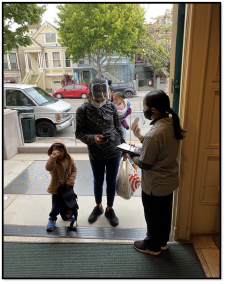
We are healthy! Followed by a wellness and temperature check for all children by one of the members of our teaching teams.
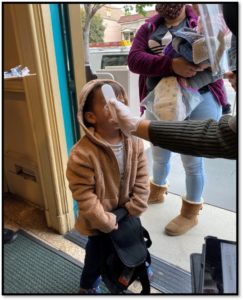
We are safe! After their temperature is checked, parents support children to wash their hands for 20 seconds!
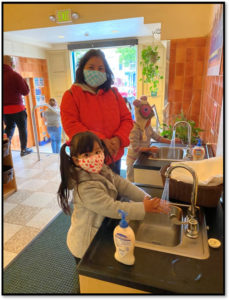
And before entering the building all children clean and sanitize their shoes.
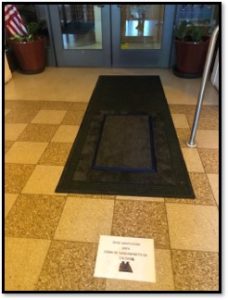
We are respectful! Teachers wear their masks and individually serve each child breakfast. The child respectfully sits in their assigned space and enjoys breakfast.
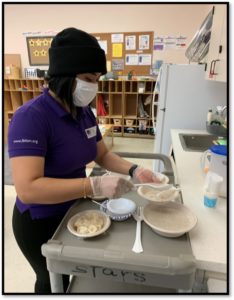
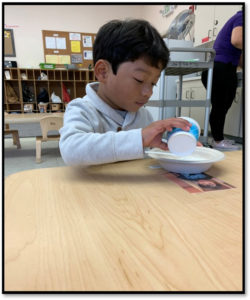
As a result of COVID-19, we also modified our classroom environments to ensure children can follow social distancing guidelines and engage with the learning materials individually.
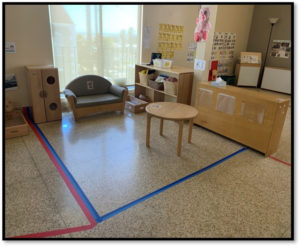
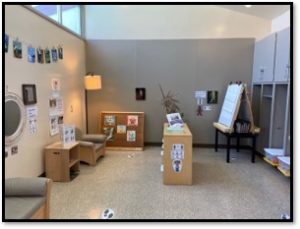
We added tables and chairs to our outdoor areas and divided the yards to allow a group of 10 children from the same classroom to play outdoors for at least one hour a day.
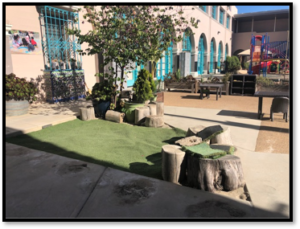
Family Support Services
Our staff has been working tirelessly to assure the continued availability of essential services while addressing the many challenges our families are facing. Through different community partnerships with Care and Doordash, every week we deliver food, and essential items consisting of baby and household cleaning and necessities to 25 families. In a recent family survey, it was reported that 65% of the families were working full-time. After COVID-19, only 28% of families are working full-time; 23% of families have been furloughed, 24% reduced to part-time work and 12% are seeking employment.
Felton Institute can’t solve generational poverty that already existed before COVID-19 and will be here after COVID-19. However, understanding this revolving cycle of perpetual poverty speaks to the need to continue our two-generation approach to support young children and offer wrap-around support and access to resources for their families. With the generous support of a private funder and First Five San Francisco, we have been able to respond to our families’ changing needs, not only before COVID-19 but also during this crisis. As part of our family support programming, Felton has continued to respond to all families via a two-generation approach. A two-generation approach will allow us to measure a degree of interruption of the perpetual cycle of impoverished households, bolster their children’s opportunities for learning and success in education and beyond, and to empower families to have a more resilient outlook for themselves and their children, particularly after COVID-19.
We continue to be the one-stop-shop for families. We know that families are struggling right now and since COVID-19, we have been distributing essential food, household, and baby items to more than 250 families every week. We have also distributed three rounds of early literacy, arts, and craft materials bags for all children. Since the COVID-19 school closure on March 16th, 2020, the education team has made weekly phone calls to families, created at- home developmentally appropriate activities, and has provided a weekly educational family newsletter.
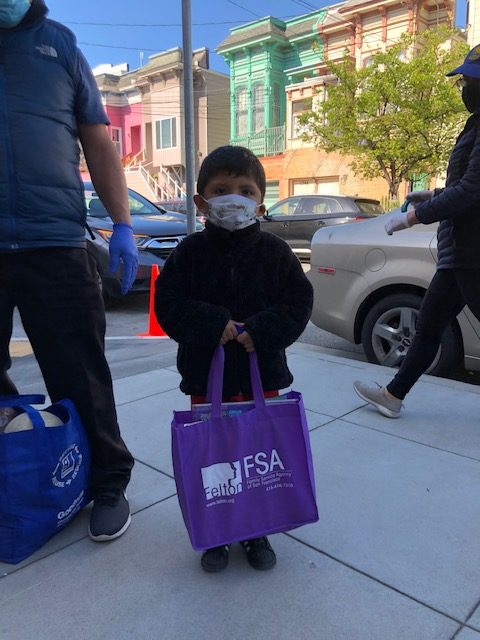
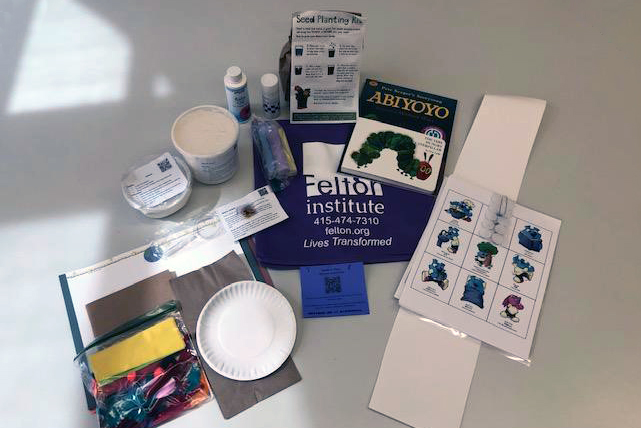
Graduation
On August 7, 2020, we celebrated our annual Preschool Graduation and seventy-one children graduated to kindergarten. Our theme “cradle to college” is rooted in the belief that, when afforded the opportunity to access quality early care and education, young children and families can reach their full potential and reduce the opportunity gap, particularly for black and brown children and those with disabilities. We reminded families of the important role they play in their child’s growth and development as the first and most important teacher and advocate. We wish our graduates lifelong success and a bright future ahead!
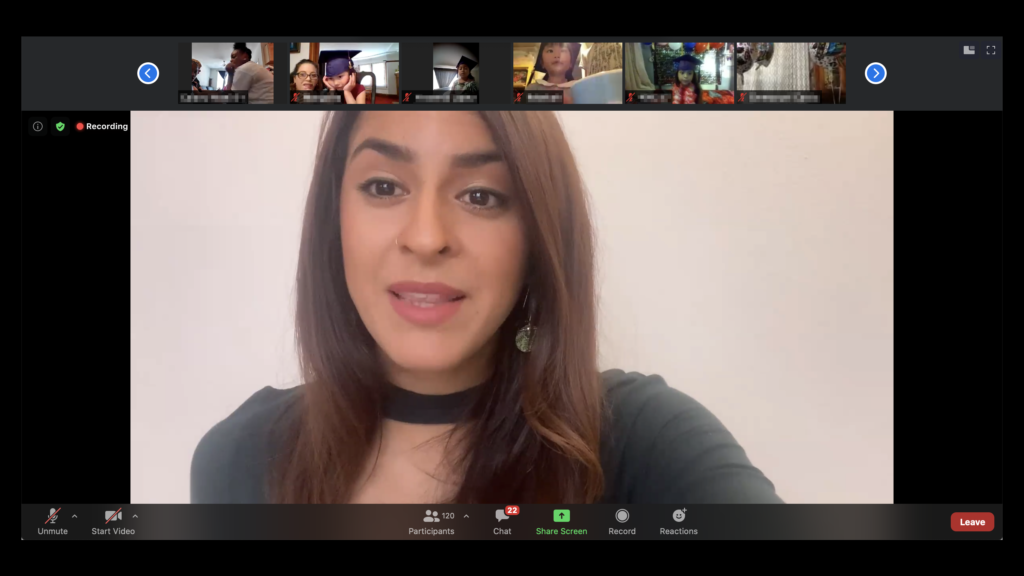
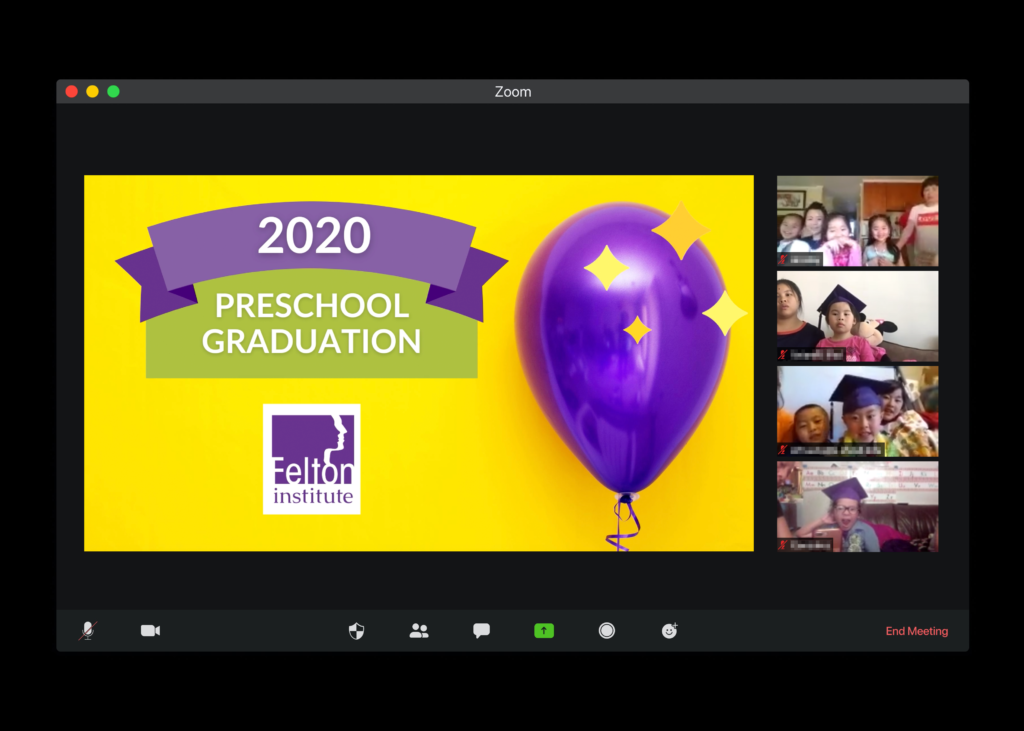
About Felton Institute: Founded in 1889, Felton Institute responds to human needs by providing cutting edge, evidence-based mental health and social services that transform lives. Felton Institute is a tax-exempt organization registered 501(c)(3) nonprofit under EIN 94-1156530.
Offering more than 50 acclaimed and honored programs that address homelessness, mental health, prenatal, adolescent, adult and senior needs, Felton Institute provides services in San Francisco, Alameda, San Mateo, Marin, and Monterey counties.
Felton is named for its social services pioneer and executive director Dr. Katharine “Kitty” Felton who was called the ”conscience of San Francisco” and was committed to ensuring that children and families in crisis have access to social services and resources in order to help them build upon their inherent strengths and develop self-sufficiency. www.felton.org
